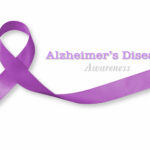Every June, our nation honors Alzheimer’s patients and their caregivers by raising awareness. Did you know that worldwide 55 million people are living with Alzheimer’s or Dementia? The hope is that by observing Alzheimer’s Awareness Month, more people will work to find a cure and help those affected by the disease.
What is Alzheimer’s?
According to the CDC, Alzheimer’s disease is a fatal disease that kills nerve cells and tissue in the brain. The disease involves a part of the brain that controls thoughts, memories, and language. It is considered the most common type of dementia. The condition is progressive. It starts with the patient having simple memory loss, and then it can lead to the loss of their ability to have a conversation and respond to their environment.
Unfortunately, scientists do not fully understand what causes Alzheimer’s disease yet. Several health factors along with individual-specific variables cause the disease. However, there is developing scientific evidence that healthy behaviors may help reduce the risk for subjective cognitive decline. Some scientists speculate genetics could be the cause of the disease. With a healthy lifestyle, disease progression could be mitigated. However, no scientific proof at this time substantiates this claim. Hopefully, Alzheimer’s Awareness Month can help raise money for additional research.
Warning Signs of Alzheimer’s Disease
Of course, memory problems are the first sign of Alzheimer’s, but you could be having memory problems for various reasons, such as certain medications or other factors. It is important to note that warning signs do not usually occur until after age 60. It is very rare for anyone under age 60 to be afflicted with this disease. However, if you are over 60 and your memory is resulting in any of the following issues, consult with a doctor.
- Changes in mood, behavior, and personality
- Poor judgment with increased uncharacteristic impulsivity
- Alzheimer’s disease or dementia is a growing disease affecting millions of people a year. June is Alzheimer’s awareness month, and the more action on finding a cure or helping those with the disease and their caregivers is inspiredTrouble handling money or remembering to pay your bills
- Problems with completing familiar tasks
- Repeating questions or repeating yourself more often
- Often misplacing items and then being unable to retrace your steps on where you could have left the thing.
How You Can Help and Observe Alzheimer’s Month
Visit the website alz.org. It will provide you with links and show you how to participate in activities to raise money and awareness for support, care, and research. Also, you can register for “The Longest Day.” On June 21st, it is the summer solstice, meaning it is the longest day of the year. The theme is standing up to the darkness of Alzheimer’s. Supporters also wear the color purple in June to represent combining the calm stability of blue and the passionate energy of red.
If you have a loved one with Alzheimer’s disease or dementia, we encourage you to seek out a support group. At Next Day Access, we will also support you and hope that our products can help make your loved ones more comfortable if they are aging in place with Alzheimer’s disease.






